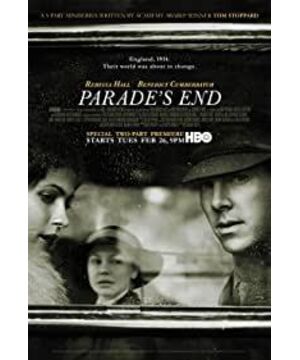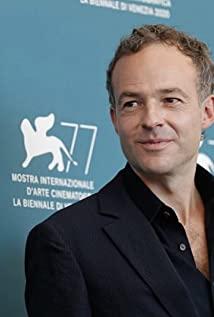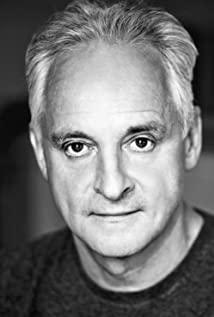There is a lot of information on the Internet, at least there will be a lot of live streams soon (Xiao Bai doesn't particularly understand what it is, just know that you can watch it free TV). On Saturday night, after a busy day, I started watching TV at midnight. read it twice.
In fact, I have read a lot of introductions on the Internet, so the two hot scenes in the first six minutes have already been spoiled in British newspapers. However, there is so much pain for loyal fans that there is no such obvious explicit sex scene in Ford Madox Ford's (original author's) book. However, it does not mean that it is not mentioned that in the sixth chapter of the book, such a sentence emerges in the subconscious of the protagonist Tiggins, which probably means that all this may be a revenge for his misdeeds in the train car. The TV series brought up this segment very bluntly, and warned the audience how Tiggins and Sylvia came together.
They are really different people. From the looks of it, Sylvia's beautiful blond hair, fair face, slender body and decent conversation make her a socialite in London's high society, while Tiggins, a nerdy government worker , The body is obese, the face is thick, and the IQ is extremely high, but the emotional quotient is basically zero. The two came together because Sylvia was pregnant. On the eve of their wedding in Paris, Sylvia continued to party with her lover, not consensual, but consensual intercourse.
The era of PE was about the same time as Sherlock Holmes. Therefore, the biggest difference between Sherlock Holmes' modernization lies in the mutual names of Sherlock Holmes and Watson. The two were known as "Holmes" and Watson in the Victorian Edwardian era, and in the BBC (British National Radio) version, the two called each other "Sherlock" and "John". interesting. So in the first episode of the second season, in a scene in Buckingham Palace, the Queen's subordinates naturally called Holmes the young Holmes, Holmes the Younger, to show the difference from McCoft. PE is no exception, Tiggins is Tiggins, and no one calls him Christopher (except for General Canbill and McMaster who occasionally call him Chris). Even Sylvia and her mother and priest called him Tiggins. It was the brand of the times, and Tiggins wore it as a badge of honor, shining on his chest. He lives out of place in this chaotic but gorgeous society, out of place without knowing it.
The novel is very stream-of-consciousness. It opens with a game where Tiggins and McMaster are on the train on their way to golf. The TV series is already in the middle of the first episode, and it is coming to an end. But reading the novel will be very confusing. I don't know if Tiegan has known Valentine at this time. Adaptor Tom Stoppard spent fifteen months putting the stories in chronological order. However, "two months ago" and "three years later" at the beginning of the TV series have already caused many audiences to scream and have a headache. Don't read novels at all. If you have no patience, you really can't read any more. I couldn't stand it either, so I looked back and forth, and it happened that my free version of Google often skipped pages in the middle (hope you go to buy a book), such a stream of consciousness, it seems that the loss is not particularly big.
The original work was published in 1924-1928. Ford entered the First World War at the age of forty-one. Although he was always stationed at the rear of the front line, he could not avoid the chance of being bombed. His own personal experience of being blown up by a bomb should show up in later episodes, because one proof is that the BBC short documentary has such a scene of Benedict Cumberbatch, and the other is Cumberbatch Qi's personal account of an accident that nearly killed him while filming a scene. However, the story is not at all about the cruelty of war (of course it was cruel), nor the perils of the First World War, but the fundamental and enormous impact of the First World War on British society. The behemoth of the British Empire, after the First World War, was the beginning of the erosive process of self-destruction of the centipede, the dead but not dead empire.
My reading is very unsystematic, and it is purely an experiment of trusting horses. However, the most systematic reading was a period of research on the British Empire and the Imperial Navy. It was during the rise of the British Empire, and this, was the beginning of the devastation. Everyone is interested, if, hey, if it wasn't for Cumberbatch's personal attraction, I'm afraid I wouldn't be so interested. Anyway, there's always someone pointing out with bad intentions that I used to love and study the story history of the Imperial Navy, and it's also a result of HC's cast at the time. My answer is always a shrug, SO? Reading is a good thing, it really doesn't matter what purpose it is for. I firmly believe this.
However, after watching the first episode, it seems that the book is easier to read. Because you can print every character that appears onto that gorgeous character. For example, Mrs. Du Ximin, the book describes her face as the details of the pre-Raphael era. The eyes and details of the actor are very similar to a painting by Leonardo da Vinci, but unfortunately there is no way to link (gossip, she is James McAvoy's wife) , James is the hero of "Atonement"), you can understand it after watching the actors.
The biggest attraction, of course, is Benedict Cumberbatch's screen transformation. I'm not very impressed with Rebecca Hall, I've only seen "The Thief in the City". Her role here is very pleasing and easy to shine. The challenge is naturally slightly less than Cumberbatch's Tiggins. Tiggins is not easy to play, but Cumberbatch can play it, and it's not easy to perform as well. Most of the online newspapers have high reviews for PE, and there are not-so-top reviews, but the main goals are adaptation-directing-sound-mixing and complexity of the story. Among them, the miscellaneous clothes are compared with the gossip of "Downton Abbey", which is very lively.
But no one (except online) is professionally blaming Cumberbatch's rendition. When I first saw it, I was very concerned about the braces in his mouth. The voice and face shape changed, which made me a little tangled (much like the taste of children's speech deformed after braces and braces). However, that will soon be forgotten. Especially in his repressed manifesto dialogue with McMaster, where the pitch seems to be an octave lower than his usual mellowness, Tiggins rather than BC, much less Holmes is firmly established.
Tiggins is very fat in the book, and Sylvia always refers to him in derogatory terms as a face pocket, a fat animal and a cow, certainly not as graceful and agile as Cumford. Tiggins is indeed very heavy to run, and people have to admire the depth of BC's integration into the role. Several highlights, with the minister, with the councilor, with the general, with friends, and brothers, the most impressive one is the two scenes of coaxing the child, appearing with the child at the same time is a test of an actor... and Valentine's several times In the field, in front of Valentine's Day, which is as pure as morning dew and fresh as sunshine, a spark of mutual attraction between the two has been established. For me, it is worth investing in and continuing to watch. See how Tiggins grasps the breakdown of his feelings for Valentine in the pedantic insistence of monogamy, and in Sylvia's contempt and provocation for his insistence.
Interestingly, PE has only been recorded once being adapted since publication. Who played Valentine? My favorite old Tata, Judy Dungey too! There is such a paragraph on the BBC website, the conversation between Valentine and Tiggins on the golf course, Deng Qi is a character actor at an old age, and a young and unattractive star. Compared with this version of Valentine, I think the BBC is really cruel Worked hard. From the very beginning of Stoppard's insistence on the still-unknown Cumberbatch, to the synthesis of every role, big and small, the set environment and props and costumes adhere to the traditional high standard, to the willingness to invest in British culture. Serious attitude, see out the basics of this society. I feel the deepest, probably at the last point.
The first episode's ratings of 3.5 million were the highest for a drama on BBC2 in seven years. Of course there is no comparison with Sherlock Holmes, the second season of Sherlock Holmes almost lasted more than 9 million, in other words, about 18% of the British population watched the peak of the scroll. It's nice that PE doesn't have the cultural popularity and mass acceptance of Sherlock Holmes, the brilliant but unknown (almost forgotten) Ford's complex stream-of-consciousness work.
************
The translation here is the end of the queue. I have been trying to figure it out for a long time, and I feel that it is not so appropriate. However, I also helplessly understand that my mastery of both Chinese and English is not at the level of ease of use, and the accuracy of translation is not something I can show off with complacent complacency. .
Parade's direct translation is the extension of "parade", which can be a parade queue or a parade. I read some novels off and on (four books that are really challenging), watched the first episode of the series adapted by the BBC (British Broadcasting Corporation) excitedly last weekend, pondering this parade, from the description of the protagonist Tiggins and the His beliefs are a norm, a form, a norm that defines the society he considers to be. In a conversation with his colleague/friend McMaster, Tiggins replied firmly, but not without depression, that gentleman's behavior is limited, you can call it parade. No matter what the world thinks of him and his demeanor, he will stand firmly in the queue and hold on to this magnificent review to the end. In this sense, the end of the queue, perhaps an acceptable translation? I am still waiting, waiting for a better interpretation.
On the surface, the language of the novel is not that challenging. Occasionally there are some big words, I followed Mr. Lu Xun's teaching (I have read English novels for many years), and I jumped over it wholeheartedly. The challenge of the novel, however, lies in its stream of consciousness and the jumps in the order of time and space. The scene where Tiggins and McMaster were on the train at the beginning, by the first episode, is already the pre-opening prelude of the main event near the end of the chronological sequence. Of course, the adaptor, Tom Stoppard's adaptation since 2008, the most important thing is to bring out the chronological order from the novel and develop the story and characters in order. However, the intricacies of characters and stories confuse readers and first-time viewers alike.
What confuses me the most is the language. After reading it twice, it can basically be said that based on my superficial understanding of the novel, the adaptation of actors and the follow-up of newspaper articles, I can generally read it without being confused. However, this is a pirated link on the Internet, without subtitles, it can be regarded as barely passing the test. As a result, there are so many people on the Internet discussing the adaptation of Tiggins and Valente in a foggy night, turning the German poems discussed by the two into Shakespeare's "Romeo and Juliet". I was taken aback. I understand this paragraph, the text is very shallow, but I have no idea about the comparison between Lark and Nightingale in "Romeo and Juliet".
......it was the nightngale
It was the lark, the herald of the morn, no nightngale
Believe me, love, it was the nightingale. Adaptor
, Tom Stoppard's choice was obvious, the choice was nothing Conceptual German poetry, while certainly showing the understanding of the two, definitely separates the viewer's attention. Using Shakespeare is easier to please, and can also express Tiggins's understanding of the literary connotation of nature, and the connotation that is not commensurate with his clumsy appearance. Stoppard's most successful work, of course, "Shakespeare in Love", uses Shakespeare to express the feelings of the two, very reasonable. I can only sigh at my attitude of ignorance of English literature.
View more about Parade's End reviews











